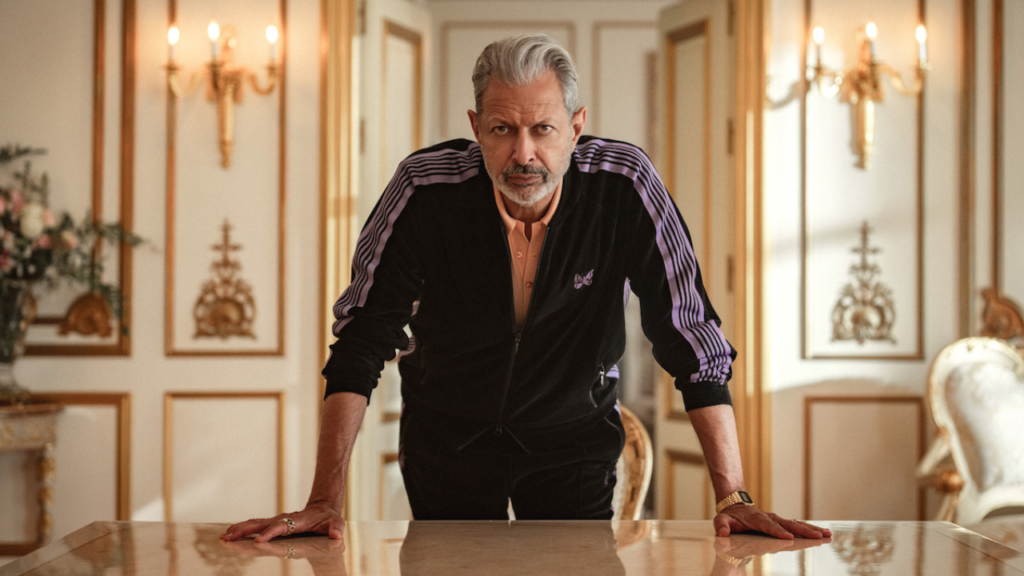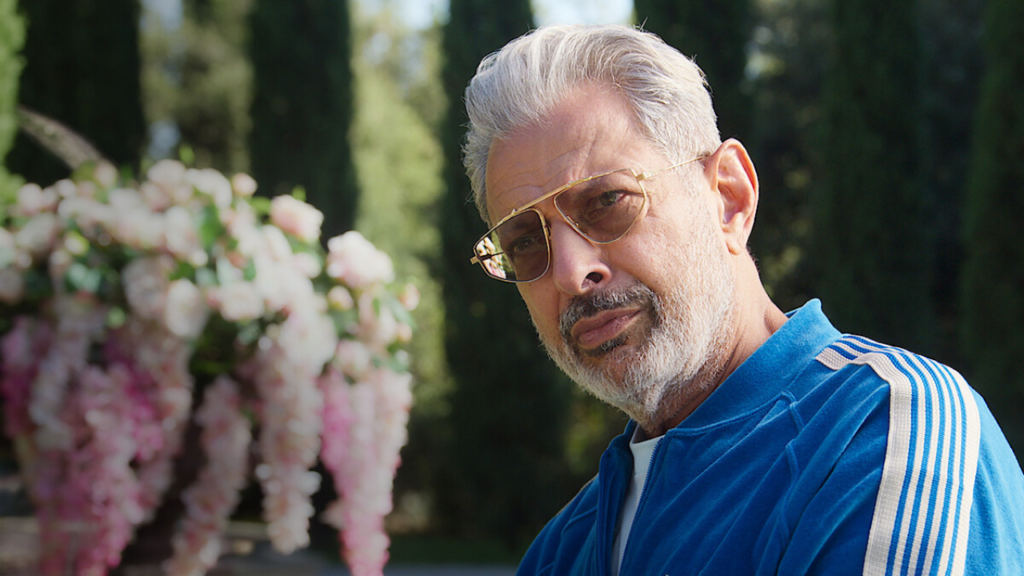Introduction:
Netflix’s “Kaos” brings a bold and imaginative twist to the timeless tales of Greek mythology, packaging it all within the framework of a dark comedy. The series is ambitious, combining the grandeur of the Olympian gods with the absurdity of their flaws, all while setting the narrative in a contemporary world. But while the premise is both intriguing and promising, “Kaos” struggles to maintain a steady rhythm, often tripping over its own realm.

The Premise of Kaos:
At its core, “Kaos” is a reimagining of the Greek gods as a dysfunctional family, complete with all the quirks, power struggles, and secrets that one might expect from a modern-day soap opera. Zeus, the all-powerful ruler of Mount Olympus, is portrayed not as a wise and just king, but rather as a self-absorbed tyrant who’s more concerned with maintaining his image than actually ruling with fairness. This approach is both refreshing and daring, presenting these mythical figures in a light that makes them relatable yet deeply flawed.
The series sets out to explore how these ancient gods would navigate the complexities of the modern world, all while dealing with the baggage of their immortal existence. Themes of power, identity, and familial dysfunction are woven throughout the narrative, giving “Kaos” a depth that goes beyond mere entertainment.

Visual Aesthetic and Production Design:
One of the most striking aspects of “Kaos” is its visual presentation. The show’s aesthetic is nothing short of spectacular, with glamorous sets that transport viewers to a world where the divine and the mundane collide. The grandeur of Mount Olympus is captured through lavish, otherworldly designs that contrast sharply with the gritty, often chaotic human world below.
Costumes are another highlight, with each character’s attire reflecting their personality and status. The vibrant, almost theatrical costumes add a layer of visual storytelling that enhances the overall narrative. Whether it’s Zeus’s regal yet extremely decorated robes or Hades’ more subdued, shadowy attire, the attention to detail in the visual design is evident.

The Cast and Performances:
The cast of “Kaos” delivers performances that are both memorable and impactful, with Jeff Goldblum’s portrayal of Zeus standing out as a particular highlight. Goldblum’s Zeus is a mix of charm and menace, a ruler who is as narcissistic as he is powerful. His ability to oscillate between comedic and sinister moments adds a layer of unpredictability to the character, making Zeus one of the most compelling figures in the series.
Other key performances include those of the actors playing Hades, Hera, and Poseidon, each bringing their own unique take on these iconic characters. The chemistry among the cast members is palpable, contributing to the show’s dynamic energy.

Themes Explored in Kaos:
“Kaos” dives deep into themes of power and corruption, exploring how absolute power can corrupt even the most divine beings. The series also tackles the concept of identity, particularly how the gods, despite their immortality, grapple with their sense of self in a world that is constantly changing. Family dysfunction is another central theme, with the relationships between the gods often mirroring those of a deeply troubled human family.
These themes are not just explored on a surface level but are intricately woven into the narrative, giving the series a thought-provoking edge. The show’s willingness to question the nature of divinity and the flaws of these supposedly perfect beings is both bold and refreshing.

The Balance of Dark Comedy and Drama:
One of the biggest challenges “Kaos” faces is balancing its dark comedic elements with the more dramatic aspects of the story. While the show excels in moments of satire and absurdity, it often struggles to maintain a consistent tone. There are instances where the humor feels out of place, disrupting the flow of the narrative and making it difficult for viewers to fully engage with the story.
However, when the balance is struck just right, “Kaos” shines. The blend of humor and drama allows for a more nuanced exploration of the characters and their struggles, adding layers to the narrative that might otherwise be missed.
Pacing and Plot Development:
Pacing is another area where “Kaos” stumbles. The series has a tendency to drag in certain episodes, with plotlines that can feel convoluted and difficult to follow. This uneven pacing can make it challenging for viewers to stay invested in the story, especially when the narrative takes detours that seem unnecessary or overly complex.
That said, the show does have moments where the pacing picks up, delivering intense and gripping scenes that keep viewers on the edge of their seats. These moments, however, are too few and far between, making the overall experience feel disjointed.

Character Development:
Character development in “Kaos” is a mixed bag. While the main characters, particularly Zeus, Hades, and Hera, are given ample screen time to develop, their arcs often feel rushed or superficial. The show introduces fascinating character traits and backstories, but these elements are sometimes glossed over in favor of advancing the plot.
Secondary characters, on the other hand, are often underdeveloped, serving more as plot devices than fully realized individuals. This lack of depth can make it difficult for viewers to form strong connections with the characters, detracting from the overall impact of the story.

Strengths of Kaos:
Despite its flaws, “Kaos” has several strengths that make it worth watching. The visual appeal of the series is undeniable, with its stunning production design and costumes drawing viewers into the world of the gods. The performances, particularly that of Jeff Goldblum, are another highlight, bringing a level of charisma and energy to the show that is hard to ignore.
The themes explored in “Kaos” are also thought-provoking, offering a fresh take on well-known myths. The series dares to ask big questions about power, identity, and the nature of divinity, making it more than just a typical dark comedy.
Weaknesses of Kaos:
However, “Kaos” is not without its weaknesses. The inconsistent tone and uneven pacing are significant issues that detract from the overall experience. The show’s struggle to balance humor with drama often results in a jarring viewing experience, making it difficult to fully immerse in the story.
Additionally, the superficial character development leaves much to be desired. While the main characters are interesting, their arcs are often rushed, and secondary characters are underutilized, leading to a lack of emotional depth in the narrative.
Critical Reception:
Critically, “Kaos” has received mixed reviews. While many have praised the show’s bold visual style and strong performances, others have pointed out its pacing issues and tonal inconsistencies. Audience reactions have been similarly divided, with some viewers enjoying the unique take on Greek mythology, while others found the execution lacking.
Compared to other reimaginings of Greek mythology, “Kaos” stands out for its originality but falls short in terms of storytelling and character development. The series has potential, but it needs to address its pacing and tonal issues to truly shine.
Is Kaos Worth Watching?
So, is “Kaos” worth your time? If you’re a fan of Greek mythology and enjoy dark comedy, there’s a good chance you’ll find something to appreciate in this series. The show’s visual style and performances are reason enough to give it a try, even if the narrative doesn’t always hit the mark.
That said, if you’re looking for a tightly paced, consistently engaging story, “Kaos” might not be for you. The series has its moments of brilliance, but they’re often overshadowed by its flaws.

Comparison to Other Mythology-Based Shows:
When compared to other mythology-based shows like “American Gods” or “Percy Jackson,” “Kaos” occupies a unique space. It’s less about reverence for the source material and more about subverting expectations, which can be both its strength and its weakness. While it brings something new to the table with its dark comedic approach, it could benefit from learning how to better balance its narrative elements.
Conclusion:
In conclusion, “Kaos” is an ambitious series that attempts to reimagine Greek mythology through the lens of dark comedy. Its strengths lie in its visual appeal, strong performances, and thought-provoking themes, but its weaknesses in pacing, tone, and character development prevent it from reaching its full potential. If you’re intrigued by the premise and enjoy a mix of humor and drama, “Kaos” is worth a watch—just be prepared for a series that doesn’t always find its footing.
Also Read:


1 thought on ““KAOS” Netflix Series Review: Netflix’s Dark Comedy Reimagining of Greek Mythology”